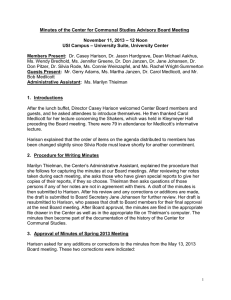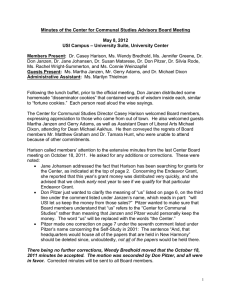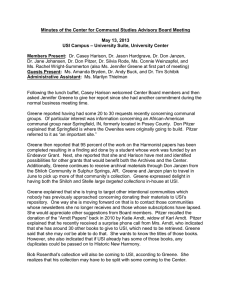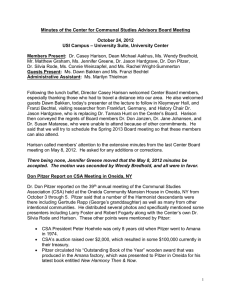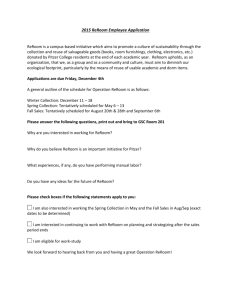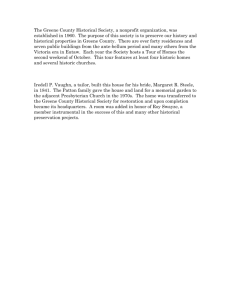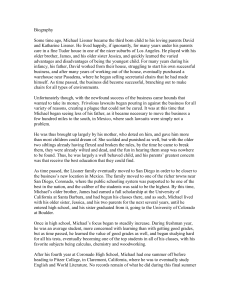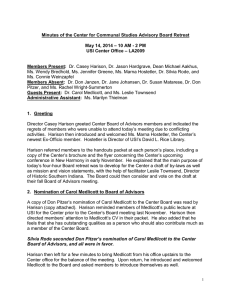Minutes of the Center for Communal Studies Advisory Board Meeting
advertisement
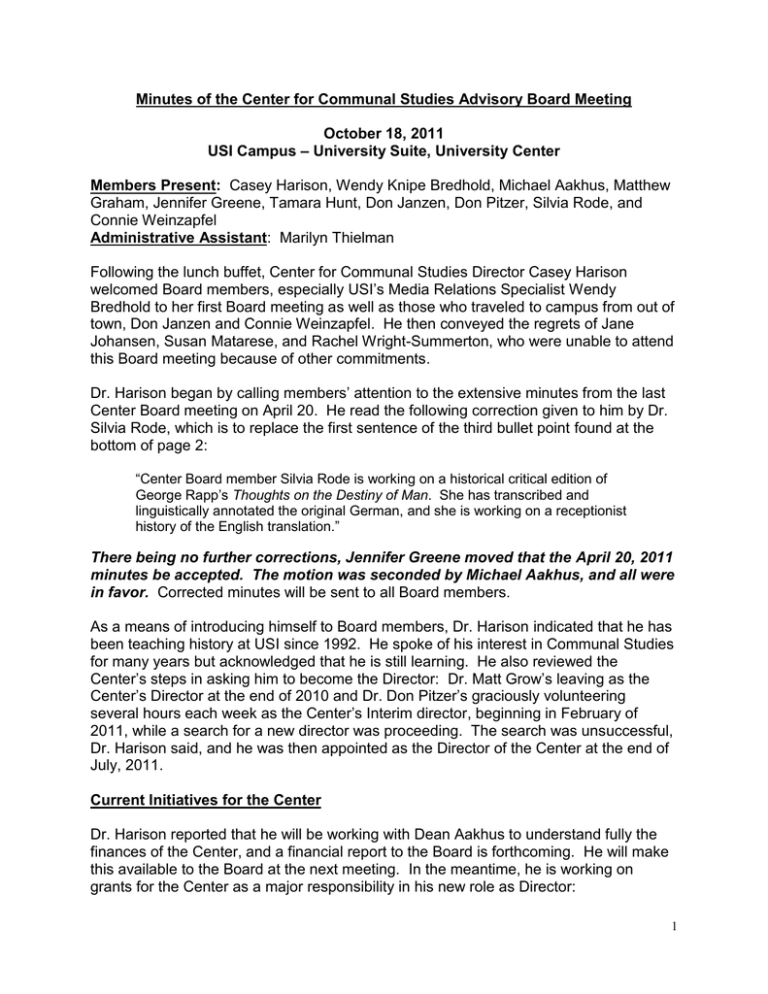
Minutes of the Center for Communal Studies Advisory Board Meeting October 18, 2011 USI Campus – University Suite, University Center Members Present: Casey Harison, Wendy Knipe Bredhold, Michael Aakhus, Matthew Graham, Jennifer Greene, Tamara Hunt, Don Janzen, Don Pitzer, Silvia Rode, and Connie Weinzapfel Administrative Assistant: Marilyn Thielman Following the lunch buffet, Center for Communal Studies Director Casey Harison welcomed Board members, especially USI’s Media Relations Specialist Wendy Bredhold to her first Board meeting as well as those who traveled to campus from out of town, Don Janzen and Connie Weinzapfel. He then conveyed the regrets of Jane Johansen, Susan Matarese, and Rachel Wright-Summerton, who were unable to attend this Board meeting because of other commitments. Dr. Harison began by calling members’ attention to the extensive minutes from the last Center Board meeting on April 20. He read the following correction given to him by Dr. Silvia Rode, which is to replace the first sentence of the third bullet point found at the bottom of page 2: “Center Board member Silvia Rode is working on a historical critical edition of George Rapp’s Thoughts on the Destiny of Man. She has transcribed and linguistically annotated the original German, and she is working on a receptionist history of the English translation.” There being no further corrections, Jennifer Greene moved that the April 20, 2011 minutes be accepted. The motion was seconded by Michael Aakhus, and all were in favor. Corrected minutes will be sent to all Board members. As a means of introducing himself to Board members, Dr. Harison indicated that he has been teaching history at USI since 1992. He spoke of his interest in Communal Studies for many years but acknowledged that he is still learning. He also reviewed the Center’s steps in asking him to become the Director: Dr. Matt Grow’s leaving as the Center’s Director at the end of 2010 and Dr. Don Pitzer’s graciously volunteering several hours each week as the Center’s Interim director, beginning in February of 2011, while a search for a new director was proceeding. The search was unsuccessful, Dr. Harison said, and he was then appointed as the Director of the Center at the end of July, 2011. Current Initiatives for the Center Dr. Harison reported that he will be working with Dean Aakhus to understand fully the finances of the Center, and a financial report to the Board is forthcoming. He will make this available to the Board at the next meeting. In the meantime, he is working on grants for the Center as a major responsibility in his new role as Director: 1 A USI grant to employ a student to produce a finding aid for the Harmonist papers in the Communal Societies collection At USI Archives. Another grant which would allow the Center to bring in a speaker or possibly conduct a workshop or seminar. He envisions finding larger grants as he proceeds. Additionally, Dr. Harison wants to work on the Center’s website to make it a hub for the Center and a place for researchers to go. He knows, however, that there is a campuswide website update currently underway. Wendy Bredhold explained that Dr. Harison’s predecessors were also interested in updating the Center’s website, but it never happened. Looking at the websites of both Jennifer Greene in Rice Library’s Archives and Connie Weinzapfel in Historic New Harmony (HNH), Dr. Harison said that he has some ideas concerning what should be on the Center’s website. He feels that his having met with Rice’s librarians recently and his meeting soon with local archivists will help him to coordinate the Center’s website with that of the Archives and HNH. Ms. Weinzapfel advised waiting a while to work on the Center’s website. Historic New Harmony employed an intern for two semesters to update their website at a cost of $300, she said. In addition to meeting with librarians and archivists, Dr. Harison wants to introduce USI faculty to the Center. Prior to that, however, he wants to determine exactly what purpose the Center should provide to both students and outside researchers. In other words, what should the role of the Center be in coordination with the Archives and HNH? Some general comments about what the Center should or could become included several ideas: a reference room where scholars could come in, a coordinating center for the various collections, and a source of papers that neither the Archives nor HNH manages. Persons mentioned as those to include in this effort were: Amanda Bryden, who manages HNH’s collections, and Steve Cochran, Interim Director of Working Men’s Institute. Creating some finding guides for the Center’s resources would be very helpful. Dr. Harison reported having attended the Communal Studies Association Annual Conference in South Union, Kentucky, on October 1, along with Don Pitzer and Don Janzen. He thoroughly enjoyed the sessions he attended and the CSA members with whom he became acquainted. He congratulated Dr. Janzen for having received the “Gina Walker Outstanding Project Award.” Both Jennifer Greene and Don Pitzer had nominated him for this special award given at the closing dinner of the CSA Conference. Dr. Janzen’s award was then shown to all Board members. Accompanying Dr. Harison on his trip to and from the CSA Conference was a visiting scholar from Frankfurt, Germany, Ms. Franzi Bechtel. She was the 2011 Center Research Travel Grant winner, who is here in our area for a month, researching 2 resources at both USI and HNH for her dissertation entitled “New Harmony – The Experiment and Its Legacy.” Dr. Harison said that we will hope to be able to make contacts at her German university through her. He expressed appreciation to all who graciously entertained Ms. Bechtel during her stay in our area. The early part of her stay was in Evansville, and she is currently staying in New Harmony at the Scholar’s Guest House for only $35 per night. Dr. Don Pitzer said that Ms. Bechtel seemed thrilled to meet Dr. Hermann Ehmer of Stuttgart, Germany, while here. Dr. Pitzer also said that she praised all who had entertained her during her time in our area. She returns to Frankfurt on October 24. Concerning some continuing projects for the Center, Dr. Harison first called on Dr. Silvia Rode, who distributed information concerning the Institute for Migration Research and Intercultural Studies (IMIS), which is an interdisciplinary and interdepartmental research institute at the University of Osnabruck in Osnabruck, Germany. Osnabruck is Evansville’s sister city, and the attached information sheet says this institute is “an international centre for academic research and interdisciplinary exchange.” Dr. Rode said that IMIS appears to be geared to faculty. She believes it has some 82 members currently involved in its organization. She will check concerning membership in IMIS and report back to the Center Board. There is an upcoming meeting with discussions about the new politics of international mobility – policies and migration patterns. Dr. Harison plans to give Dr. Rode some items about the Center to take along with a letter of interest, hoping to gain and expand connections with other countries and organizations. Indeed, “communal studies” is not something that German universities normally house. In that regard, Dr. Don Janzen said it would be good to give a report about Communal Studies at the end of the year. Dr. Tamara Hunt indicated that the History Newsletter which she distributes does indicate what the Center is doing. She further explained that there has to be a year-end report concerning what has been going on in the Center. Dr. Harison agreed that the Center needs to do more things that are “public.” Ms. Weinzapfel said there is a new faculty reception in the fall; maybe the Center ought to be represented there. USI’s Deans and Provost Dr. Rochon attend those receptions. Dr. Harison plans to put together a power presentation to introduce the Center and its resources – not in the fall but in the spring. To further explain the Center’s continuing projects, Dr. Harison called on Marilyn Thielman, the Center’s Administrative Assistant, to report concerning her projects, working two days a week in the Center. Her annual projects include assisting with administering the Center Prize – $500 awarded to the best graduate paper or thesis or dissertation chapter and $250 awarded to the best undergraduate paper; the annual deadline for these submissions is January 15. She also assists with administering the Center Research Travel Grant – up to $2,000 awarded; the annual deadline to receive applications is May 1. Ms. Thielman also conducts current continuing projects: Transcription of some 70 90-minute oral interviews on CDs, which will complete the collection of about 500 interviews done by Tim Miller, Professor of Religious Studies 3 at the University of Kansas, for his book The 60s Communes. All interviews will be published on the Center’s website after completing our “due diligence” to contact all those interviewed for permission to publish their interviews. Conversion of old intentional community videos in the Center to DVDs is nearing completion by USI’s IT Department. Many include Dr. Don Pitzer’s hand-written notes from his visits to the various communities. Ms. Thielman recently sent the last batch to IT for conversion. Upon its return, a determination of some way to catalog the DVDs needs to be made. The Archives has no space to keep these DVDs. Listing and filing of all materials received periodically from intentional communities. There are 234 individual community files in the Center – which were beefed up by a special mailing done in 2009 to some 730 communities listed in the FIC’s Community Directory. Many new intentional community files were added due to this mailing. Maintaining an ongoing list of researchers in the Center. Some 80 resource books were added to the Center’s library materials by Dr. Matt Grow. A determination needs to be made, working with USI’s librarians, just how to group them on the Center’s shelves. It has been estimated that it will be a year’s time before the librarians can properly assist Ms. Thielman with this project. As materials are received from the various communities, post-card notification of Dr. Harison’s new role as Director is mailed. Ms. Thielman said that she has assisted four different persons in the Center while working part-time for four years. Next, Dr. Harison asked Jennifer Greene to give a brief update concerning the Archives and its connection to the Center. Ms. Greene reported having in the Archives over 600 files on intentional communities, finding aides for at least 98% of those communities, and 12,000 images of intentional communities nationally. She wants to expand internationally and to include more contemporary 20th and 21st century communities. She still thinks that would be a good way to distinguish between the archival material of HNH and USI. Connie Weinzapfel remarked that that is open to discussion, however. Ms. Greene then expressed her feelings concerning the roles of the Center and the Archives. She sees the Center as the first contact and the Archives as the place to actually house the intentional community files. Concerning the broad subject materials, she envisions the Center could make those more readily available. Ms. Greene reported having spent the first two years in the Archives working on communal studies, but she now needs to take things in several different directions. Currently a student worker is focusing on finding aides for the Harmonist papers. Again, coordination could be done through the Center. Dr. Harison said that he sees the Center mostly for research. Concerning Ms. Greene’s desire to have information on more contemporary communities, Dr. Don Janzen reported on a community which began in 1942, a period where the Archives has little information – Shiloh Farms. Shiloh was an organic food distributor located in Chautauqua County, the northern most county in western New York. Later, they located in northeastern Arkansas as well and were purchased by John Brown University. Their food is still distributed in New Holland, Pennsylvania. 4 Dr. Janzen visited Shiloh’s dying community in June and was given six boxes of their entire archival material. He now spends some 20 to 30 hours each week getting it all organized, and he hopes to turn everything over to Ms. Greene for the Archives early next year. Their materials include an extensive photo collection, 400 newspaper articles, short bios on each location, all of their food and seed catalogs from 1967 through 1977, and their daily diaries. Dr. Janzen said that his next project will be a visit to New Vrindavan in the mountains of West Virginia. Dr. Don Pitzer told of his visit to that community in an earlier year, and he explained that Dr. Janzen has already written a chapter concerning “alternative organizations” which includes that community for Dr. Pitzer’s forthcoming book. Discussion regarding Ideas and Goals for the Center – Short-term (2 to 3 years) and Long-term (4 to 6 years) Short-term Jennifer Greene: Concentrate on inventories and finding aids for the Center’s collection. Create an awareness of the Center, starting with the USI community. Develop a brochure and then the website. Reach out to anthropology, sociology, and psychology. One of the biggest problems that the Center has is that many people don’t know about it. Connie Weinzapfel: Put together a display about Communal Studies in the Archives. Jennifer Greene: Bring back the lecture series. Casey Harison: Develop better signage and possibly have a book signing for Don Pitzer’s new book. Jennifer Greene: Display posters and artifacts to show the interdisciplinary nature of communal studies. Casey Harison: Again, I would like a power point presentation within the next year. Jennifer Greene: Make a personal pitch to the other departments and then have an “open house” for the Center and the Archives. Don Pitzer: Include the Shiloh organic farming materials at the open house. Silvia Rode: Highlight a great deal. Long-term 5 Jennifer Greene: Within three to five years create a resource directory that can be accessed globally to gain national and international recognition. Don Pitzer – Casey already has an international orientation. Casey Harison: I need to establish my own reputation as a scholar. I will do a class on “European Origins of the Utopians.” Don Janzen: If the Center highlights an occasional new book, such as the one that Don Pitzer and I are working on, Quotable Quotes of New Harmony’s Utopian Founders, and there is external funding used to promote it, will USI let the Center keep the money from those sales? Is the Center to be in the business of selling books? Connie Weinzapfel: New Harmony is in the business of doing that. Don Janzen: A communitarian had the idea about the 70s having raised our goals. It makes you think in a different way. Many ideas raised in the 70s are now relevant to our present day, such as recycling, home schooling, and organic foods. If we can raise the funds, does the Center want to go that way? Casey Harison: This is what the Center should be doing. I’m currently working on grants for funding. Michael Aakhus: If there are certain projects that you want to do, the Foundation is looking at those now. Express your ideas to the Foundation. Don Janzen: That would promote the Center as well as USI in general. Connie Weinzapfel: New Harmony’s 2014 Bicentennial (August 1 – 10) will provide a showcase for many publications, such as Don Pitzer’s new book New Harmony Then and Now. Don Pitzer: A publication for the Bicentennial that highlights the relevant lessons from intentional communities would be great. Casey Harison: Could the Center sponsor a scholarly conference during that period? Wendy Bredhold: I got very excited about the minutes from the last meeting since I was unable to attend. Contemporary communities have been so far ahead in addressing current issues. Connie Weinzapfel: “Lessons from Communalism” would be a great title of a conference. Don Pitzer: Various people could come and speak at different times from 2011 through 2014. 6 Jennifer Greene: The 2010 CSA Conference in New Harmony ran the gamut of everything – crossing all boundary lines. Michael Aakhus: That I had never seen before! Jennifer Greene: The Center doesn’t have a mission statement. Connie Weinzapfel: Malcolm Hutchinson will be based in New Harmony from November 4 through 16. He has started the Robert Owen Institute. He is coming at it from a social entrepreneurship standpoint. Maybe he can spend a day in the Center. The recent visit by librarians from New Lanark, Scotland, was very helpful to both them and us. Mr. Hutchinson is retired and is kind of working through New Lanark as a consultant. He could be helpful to the Center as well. Don Pitzer: Docey Lewis is working on this. I emailed Connie Weinzapfel about that. Phil Hageman is a composer of music and is working on an original composition for the Bicentennial. Jennifer Greene: Jim Sanders digitized musical scores as well. Don Pitzer: The Center did a Self-Study in 2001, which addressed converting the Center into an institute for learning with headquarters for the Center in New Harmony. The International Communal Studies Association (ICSA) is still looking for a headquarters. I understand that the school in New Harmony may soon be unoccupied. Connie Weinzapfel: It is very serious. There have been many meetings over the past dozen years about closing the school. The enrollment has dropped and dropped during that time. New Harmony would be the natural place for such a headquarters, considering that the materials, the auras, and the spirit are already there. We just have to realize there is a need. How can we seize it? Wendy Bredhold: A master’s degree is needed for communal studies. That should become part of the goals for the end of the school year. Casey Harison: What about bylaws for the Center? Connie Weinzapfel: I feel that we should think about a mission statement first – the vision, goals, and objectives. There being no further discussion, Dr. Harison thanked Board members for their individual input. He felt that it was a very productive meeting. The meeting adjourned at 1:40 p.m. Respectfully submitted, Marilyn Thielman, Scribe 7
